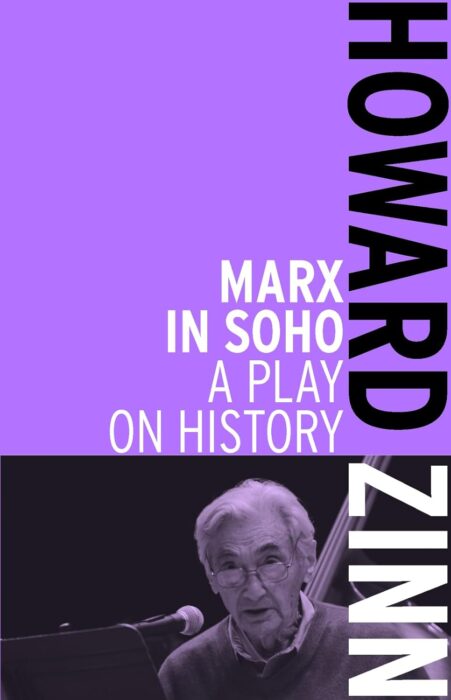
Publisher : Haymarket Books; Third edition (January 9, 2014)
Language : English
Paperback : 88 pages
ISBN-10 : 160846301X
ISBN-13 : 978-1608463015
Item Weight : 3 ounces
Dimensions : 4.9 x 0.3 x 6.8 inches
Price: $13.19
Marx reloaded?
“Marx in Soho: A Play on History,” penned by renowned US historian Howard Zinn, presents a profound exploration of the life, thoughts, and enduring legacies of one of the most influential figures in political theory—Karl Marx. Set in a modern-day Soho (NYC), the play imagines a fantastical scenario where Marx, having been granted a brief return to life, finds himself navigating the complexities of contemporary society, grappling with the implications of his ideas in a world shaped by capitalism and class struggle.
Zinn’s work transcends conventional biographical narratives to offer an incisive critique of economic structures and social injustices that continue to resonate today. Through Marx’s eyes, audiences are invited to reflect on the paradoxes of modern life, the disparities between wealth and poverty, and the potential for revolutionary change in an era often characterized by apathy and resignation. The play serves not only as a vehicle for rethinking Marx’s theories but as a call to action, challenging viewers to confront their own roles within the socio-economic landscape.
With wit, humor, and poignant insight, “Marx in Soho” fosters a dialogue about the relevance of Marxist thought in the face of contemporary crises. As audiences witness this iconic thinker confront the realities of the 21st century, they are prompted to reconsider the foundations of their own beliefs, the structures of power that govern their lives, and the enduring quest for justice and equality. In this rich tapestry of history, philosophy, and theatre, Zinn reminds us that the past is still very much being written, since its lessons are still alive and resonant in today’s struggles.
Core themes
In Zinn’s one-man play, the character of Karl Marx raises a thought-provoking question: “Don’t you wonder: why is it necessary to declare me dead again and again?” This inquiry serves as a catalyst for exploring themes that return throughout the performance, including the nature of historical legacy, the interplay between radical ideas and mainstream narratives, and the quest for relevance in a contemporary context.
Historical Legacy and Misrepresentation
One of the play’s central themes revolves around the idea of historical legacy and how figures like Marx are often misrepresented or oversimplified in the public consciousness. Marx’s assertion of being declared “dead” repeatedly underscores the ways in which radical thinkers are often marginalized or dismissed in contemporary discourse. It invites the audience to reflect on the nature of history itself: who gets to tell it, how narratives are shaped, and what voices are amplified or silenced. By resurrecting Marx in modern-day Soho, Zinn prompts viewers to engage with the complexities of his ideas and their implications for today’s socio-economic landscape. This act of “resurrection” serves not only as a theatrical device but as a metaphorical reclamation of Marx’s ideas from the clutches of misinterpretation.
Authority and Bureaucracy
Marx’s arrival in the afterlife and subsequent bureaucratic error that lands him in the wrong place is emblematic of the friction between authority and radical thought. The absurdity of his predicament highlights the often absurd nature of bureaucratic systems that can stifle revolutionary ideas. This theme serves as a critique of institutions—both historical and contemporary—that seek to maintain order at the expense of progressive change. By navigating this bureaucratic absurdity, Marx symbolizes the struggle of radicals who challenge oppressive systems and the lengths they must go to be heard.
Relevance of Radical Ideas
Another pivotal theme is the relevance of radical ideas in a modern context. As Marx attempts to make his case to a contemporary audience, he engages with the ongoing struggles against capitalism, inequality, and social injustice. This interaction serves to illuminate how Marx’s critiques remain pertinent amid today’s socio-economic challenges. The performance becomes a platform for a dialogue that transcends time, encouraging the audience to reconsider the utility of Marxist philosophy in analyzing and addressing the complexities of the current world.
Resistance and Agency
The question posed by Marx also echoes broader themes of resistance and agency. The repeated declarations of his “death” can be seen as a metaphor for the suppression of dissenting voices and radical movements throughout history. Zinn’s portrayal invites the audience to recognize the inherent potential for agency in challenging established narratives. By resurrecting Marx, the play suggests that radical thought can never be fully extinguished; it continues to evolve and resist, finding new expressions in different eras.
Conclusion
In “A People’s History of the New World,” Marx’s struggle for recognition and relevance is both a commentary on his own historical context and a call to action for contemporary audiences. The themes of historical legacy, bureaucracy, the relevance of radical ideas, and the nature of resistance intertwine to present a vibrant tapestry of dialogue about how society remembers and engages with its radical thinkers. Howard Zinn’s play not only revives Marx but invites us to grapple with the enduring questions of justice, equity, and the power of revolutionary thought in an ever-changing world. Through this resurrection, it challenges us to reflect on why radical ideas matter—why they must be acknowledged, understood, and, ultimately, revered as part of our ongoing struggle for a more just society.
About the author(s)
Howard Zinn (1922-2010) was an American historian, playwright, and social activist best known for his influential work, “A People’s History of the United States.” Born to immigrant parents in Brooklyn, New York, Zinn’s early experiences shaped his commitment to social justice and civil rights. He served as a bombardier in World War II, later becoming a professor of history at Boston University. Zinn’s scholarship challenged traditional narratives of American history by emphasizing the perspectives of marginalized groups, including laborers, women, and people of color. His work sparked widespread debate and inspired generations of activists and educators, advocating for a more inclusive understanding of history that recognizes the struggles and contributions of everyday people. Through his writing and activism, Zinn left a lasting legacy that continues to resonate in discussions about inequality, power, and resistance in society.
Reader reactions
- Humanization of Marx: Many readers felt that the play successfully portrays Karl Marx as a relatable and humane figure, moving beyond the often negative and one-dimensional political caricature. Thomas Rasmussen highlighted the importance of showing Marx’s humanity amidst a backdrop of confusion about his legacy.
- Engaging and Thought-Provoking: Readers like Dragoslav Kirjas found the play to be an engaging read that prompts reflection on social injustices prevalent in society. Eric simply stated that he loved the book, while Hoka Hey described it as “entertaining and informative,” indicating the play’s ability to captivate its audience intellectually.
- Accessible Writing Style: Jorge Arias praised Zinn’s straightforward and witty approach, making complex ideas about Marx and his family relatable and easy to digest. This accessibility was appealing to readers who appreciated the simplicity yet depth of the monologue.
- Advocacy for Educational Use: Some reviewers, like Dragoslav Kirjas, suggested that the play should be introduced in high schools across the country, indicating a belief in its educational value and relevance to young audiences.
- Contemporary Relevance: Hoka Hey mentioned the play’s confrontation of capitalist themes and its relevance in today’s socio-political context, engaging readers by addressing significant issues like economic disparity and social injustice.
- Quality of Writing and Research: Stephen Ornelas commended Zinn for his extraordinary research and ability to make the text immersive, encouraging readers to connect with the historical context while engaging in the narrative.
Overall, readers appreciated the play for its thoughtful portrayal of Marx, its engaging writing style, and its relevance to contemporary societal issues.
